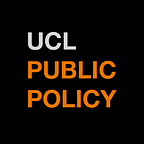Engaging with the UK Parliament — ‘My Science Inquiry’
When I heard about the first ‘My Science Inquiry’ in 2017, I was intrigued by the call from the House of Commons Science and Technology Committee for ideas for potential Select Committee inquiry topics. But I did not think I would ever suggest one — it seemed ‘too big’. When the second call for submissions opened in December 2018, my opinion had changed. My colleagues and I had just been working on a topic that seemed ‘big enough’ in an area where I genuinely felt an inquiry was needed: the health and productivity impacts of climate change. We know a substantial amount about health and climate change, but the information is dispersed, not necessarily considered in policies, and there are crucial knowledge gaps. So, after many conversations with colleagues I decided to lead a submission on behalf of the UCL Energy Institute.
On the 9th of January, I got the email to say the submission had been short-listed for a presentation in front of the HoC Science and Technology Committee, as one of 10 out of more than 80 submissions. Exciting but also somewhat nerve-wracking! Although the presentation was on my area of expertise I still had to spend a substantial amount time getting up to speed on the latest policy developments, past inquiries and translating complex academic research into policy sound-bites. All this to ensure that my 5-minute pitch was engaging and well received.
I contacted Dr Khaled Taalab, Research Facilitator at BEAMS for advice who put me in touch with Dr Olivia Stevenson, Head of UCL Public Policy and Dr George Dibb, Head of Industrial Strategy and Policy Engagement. George, Olivia, and Khaled along with my line manager, Prof. Tadj Oreszczyn, formed a mock comittee, in preparation for the real thing. Tadj’s support was invaluable. He commented on early versions of both my submission and my pitch and answered my last-minute questions, all of which helped me feel confident on the day.
There was a substantial amount of communication through the clerks of the Committee beforehand, mainly through email but also a phone call. I requested a presentation slot towards the end of the evidence session because childcare arrangements would have made it tricky to get from home to Westminster for a 9am start. This was accommodated, and all communications beforehand were friendly, timely, and helpful!
The evidence session itself was likewise a positive experience. A clerk was on hand outside the room in advance to give some more information; all MPs were listening carefully to everything that was presented; questions were to the point, asked directly but always in a helpful manner.
The results of the evidence session were communicated a few weeks later. Whilst my pitch, unfortunately, wasn’t selected for a full inquiry, the Science and Technology Committee wrote a letter to Claire Perry, Minister of State for Energy and Clean Growth to ask for a comment on the four points I had raised as part of inquiry pitch. These were:
1. Where government funding is best positioned to fill gaps in our knowledge.
2. Improving regulations and standards — protecting people’s health and safety is something that is often regulated, we need to make sure that our regulations are fit for the future.
3. Making sure the same metrics are used in various assessments.
4. Making sure that health benefits are costed in all government policies related to mitigating climate change.
I had the opportunity to suggest changes to the letter, and to comment on the Minsters response.
So, is it worth doing? Yes! It is a great opportunity open to anyone to engage with policy and scrutiny of the government outside of personal networks and to potentially have a substantial impact by getting a full inquiry launched into a topic of major importance and a pressing area of public policy. It also makes a nice change to the usual workday, going to Westminster Hall, with a letter in the hand saying ‘visitor on committee business’, for once presenting without Powerpoint, being filmed on Parliament TV, and meeting interesting people. Too often, academics, including myself, stay within our academic bubble; this is a great opportunity to communicate the importance of our research to policymakers. Also, as it is open to everyone, it is a particularly good chance for Early Career academics — who are less likely to be invited as expert witnesses — to make an impact.
Oh, and finding the room, which is a reoccurring nightmare of mine, wasn’t a problem! I did have to ask for directions three times but there was always someone on hand to show me the way!
Dr Gesche Huebner is a Lecturer in the UCL Energy Institute, within the Bartlett School of Environment Energy and Resources.
